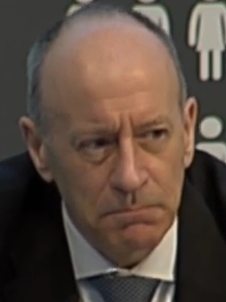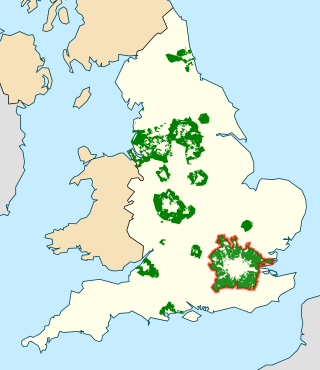
The mayor of London is the chief executive of the Greater London Authority. The role was created in 2000 after the Greater London devolution referendum in 1998, and was the first directly elected mayor in the United Kingdom.

The Greater London Authority (GLA), colloquially known by the metonym City Hall, is the devolved regional governance body of Greater London, England. It consists of two political branches: an executive Mayor and the 25-member London Assembly, which serves as a means of checks and balances on the Mayor. Since May 2016, both branches have been under the control of the London Labour Party. The authority was established in 2000, following a local referendum, and derives most of its powers from the Greater London Authority Act 1999 and the Greater London Authority Act 2007.
The knowledge economy, or knowledge-based economy, is an economic system in which the production of goods and services is based principally on knowledge-intensive activities that contribute to advancement in technical and scientific innovation. The key element of value is the greater dependence on human capital and intellectual property as the source of innovative ideas, information and practices. Organisations are required to capitalise on this "knowledge" in their production to stimulate and deepen the business development process. There is less reliance on physical input and natural resources. A knowledge-based economy relies on the crucial role of intangible assets within the organisations' settings in facilitating modern economic growth.

Julian Benjamin Pipe is a British politician who currently serves as the Deputy Mayor of London for Planning, Regeneration and Skills. Pipe was the first directly elected mayor of the London Borough of Hackney between his election in October 2002 and his resignation in the summer of 2016.

London Councils is the collective of local government in Greater London, England. It is a cross-party organisation that represents London's 32 borough councils and the City of London. It was formed in 1995 as a merger of the London Boroughs Association and the Association of London Authorities. In April 2000 it gained further functions as strategic local government in London was reorganised. London Councils is a think tank and lobbying organisation, and also provides some services directly through legislation that allows multiple local authorities to pool responsibility and funding, such as Freedom Pass. London Councils is based at 59½ Southwark Street. It is due to move to 12 Arthur Street in the City of London in 2024.

Sadiq Aman Khan is a British politician serving as Mayor of London since 2016. He was previously Member of Parliament (MP) for Tooting from 2005 until 2016. A member of the Labour Party, Khan is on the party's soft left and has been ideologically characterised as a social democrat.

The London Plan is the statutory spatial development strategy for the Greater London area in the United Kingdom that is written by the Mayor of London and published by the Greater London Authority. It is updated from time to time.

The Garden Bridge project was an unsuccessful private proposal for a pedestrian bridge over the River Thames in London, England. Originally an idea of Joanna Lumley, and strongly supported by then-Mayor of London Boris Johnson, the designer Thomas Heatherwick worked with Arup Group on a proposal by Transport for London (TfL) for a new bridge across the Thames between Waterloo Bridge and Blackfriars Bridge. The proposed concrete, steel, cupronickel clad structure was intended to carry pedestrians, with no cycles or other vehicles. It was to have been located some 200 metres (660 ft) from Waterloo Bridge and 300 m (980 ft) from Blackfriars Bridge, and have included some areas of planting. The project was to include a commercial building, built on former green space at the southern end of the bridge. The bridge was intended to be funded by raising over £140 million of private money and £60 million of promised public money, of which £30m was from Transport for London and £30m from the Department for Transport, adding up to projected funding of over £200m. In January 2017, the trustees of the prospective owner of the bridge, the Garden Bridge Trust, stated that costs would "substantially exceed" an earlier revised total of £185m and, in April 2017, a report by Margaret Hodge MP concluded, on the basis of the Garden Bridge Trust's own evidence, that the cost would be over £200m.

Charles Leadbeater, also known as Charlie Leadbeater, is a British author and former advisor to Tony Blair.

The economy of London is dominated by service industries, particularly financial services and associated professional services, which have strong links with the economy in other parts of the United Kingdom (UK) and internationally. In addition to being the capital city of the United Kingdom, London is one of the world's leading financial centres for international business and commerce and is one of the "command centres" for the global economy.

The Metropolitan Green Belt is a statutory green belt around London, England. It comprises parts of Greater London, Berkshire, Buckinghamshire, Essex, Hertfordshire, Kent and Surrey, parts of two of the three districts of Bedfordshire and a small area in Copthorne, Sussex. As of 2017/18, Government statistics show the planning designation covered 513,860 hectares of land.

East London Tech City is a technology cluster of high-tech companies located in East London, United Kingdom. Its main area lies broadly between St Luke's and Hackney Road, with an accelerator space for spinout companies at the Queen Elizabeth Olympic Park.

The 2016 London mayoral election was held on 5 May 2016 to elect the Mayor of London, on the same day as the London Assembly election. It was the fifth election to the position of mayor, which was created in 2000 following a referendum in Greater London. The election used a supplementary vote system.
Innovation districts are urban geographies of innovation where R&D strong institutions, companies, and other private actors develop integrated strategies and solutions to develop thriving innovation ecosystems–areas that attract entrepreneurs, startups, and business incubators. Unlike science parks, innovation districts are physically compact, leverage density and high levels of accessibility, and provide a “mash up” of activities including housing, office, and neighborhood-serving amenities. Districts signify the collapse back of innovation into cities and is increasingly used as a way to revitalize the economies of cities and their broader regions. As of 2019, there are more than 100 districts worldwide.

The 2021 London mayoral election was held on 6 May 2021 to elect the mayor of London. It was held simultaneously with elections for the London Assembly, other local elections across England and Wales, and devolved elections in Scotland and Wales. The mayoral and Assembly elections were to be held on the 7th of May 2020, but in March 2020 the government announced the election would be postponed until 2021 due to the COVID-19 pandemic.

London independence, sometimes shortened to Londependence and Londexit, refers to a belief favouring full-fledged independence for London as a city-state separate from the United Kingdom. The idea received particular attention after the 2016 United Kingdom European Union membership referendum, in which the country at large voted to leave the European Union, but 60% of Londoners voted to remain, though the concept of an independent London had been discussed sporadically for some years before.

WebRoots Democracy was a London-based think tank focused on progressive and inclusive technology policy. It was founded in May 2014 and closed in November 2020.
The Indigo Era is a concept publicized by businessman Mikhail Fridman, describing what he views as an emerging new era of economies and economics based on ideas, innovation, and creativity, replacing those based on the possession of natural resources. Fridman is the co-founder of LetterOne, an international investment business, and first publicized the idea in early 2016. The word "indigo" was initially chosen based on the term indigo children, which has been used to describe people with unusual and innovative abilities.

The Ultra Low Emission Zone (ULEZ) is an area in London, England, where an emissions standard based charge is applied to non-compliant road vehicles. Plans were announced by London Mayor Boris Johnson in 2015 for the zone to come into operation in 2020. Sadiq Khan, the subsequent mayor, introduced the zone early in 2019. The zone initially covered Central London, the same area as the existing London congestion charge; in 2021, Khan extended the zone to cover the area within the North Circular and South Circular roads. In 2023 it was further extended to all of Greater London, covering over 1,500 square kilometres (580 sq mi) and approximately 9 million people.

Hina Bokhari is a British politician and educator. A member of the Liberal Democrats, Bokhari has served as a Member of the London Assembly since the 2021 election. Upon her election, she became one of the first Muslim women to serve in the assembly.















